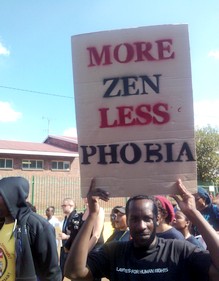
First published in City Press
The glare from the xenophobic flames burning these past weeks should not blind us to the reality that what we are witnessing is simply a moment in the slow violence to which immigrant communities are subject every day and in every interaction with South African officialdom.
After a long and extraordinarily hazardous journey down the continent they meet our venal border post officials, who extract the first in a long series of bribes. At the refugee centres, they have to bribe the brutal so-called security guards just to secure a place in the winding queues.
It is repeated endlessly at the hands of home affairs officials who extract their pounds of flesh. It is omnipresent when they step out on to the streets and encounter the various law enforcement authorities for whom their vital pieces of paper are just … pieces of paper.
It continues unabated as they try to earn a livelihood. Those resourceful immigrant entrepreneurs who set up small businesses soon encounter the metro police charged with enforcing municipal by-laws. And woe betide those who try to invoke their rights. Their reward is a broken skull and a trashed street stall.
Those who are marked for deportation experience the delights of our Dickensian deportation centres, businesses run by private sector security firms.
Is it any wonder that ordinary, economically insecure South Africans view immigrants as theirs for the taking? They have after all learned at the feet of the masters. Throw into this toxic stew a few incendiary remarks from a tribal monarch and what do you have? Mayhem and murder.
It’s not an inexplicable flare-up. It’s a continuum, a cycle of gross and never-ending abuse.
Immigrants persevere despite adversity
That despite all this, the immigrant communities have established some of the most socially and economically dynamic sites in our cities is a tribute to their resourcefulness and a measure of their contribution to the country.
If our political leaders genuinely respected Africans and had any regard for the rule of law in its daily application, then the violence of past few weeks would never have happened.
It’s often said that a society should be judged by the way it treats its most vulnerable people. Judge then how official South Africa treats its most vulnerable communities.
Our leaders did not lead
There are some positives to be taken out of the response to these shameful events. They are decidedly not be found in President Jacob Zuma’s lacklustre address to Parliament, or in the members of his cabinet, all of whom were initially more concerned with appeasing the Zulu king by offering implausible reinterpretations of his plain words, than with confronting the crisis.
To be sure, some leaders have evinced real concern. The Gauteng premier, David Makhura – who showed an unconditional willingness to throw in his lot with civil society – is particularly noteworthy.
The really good stories are the little publicised efforts of the residents of Katlehong to guard the lives and property of the immigrants in their community, something which has probably happened in several other communities.
Equally positive is the speed with which a coalition of civil society organisations has come together. Without relentless civil society pressure we’ll see a reversion to the slow violence that is the lot of immigrants in this country.
Xenophobia, tribalism and racism are all subsets of a hatred and suspicion of the other and are all fault lines that run through South Africa. Today we have a tribal leader mouthing off about foreign nationals. Tomorrow he may be directing his invective at other tribes on ‘his’ turf.
We need to be careful. Very careful.
• David Lewis is executive director of Corruption Watch
